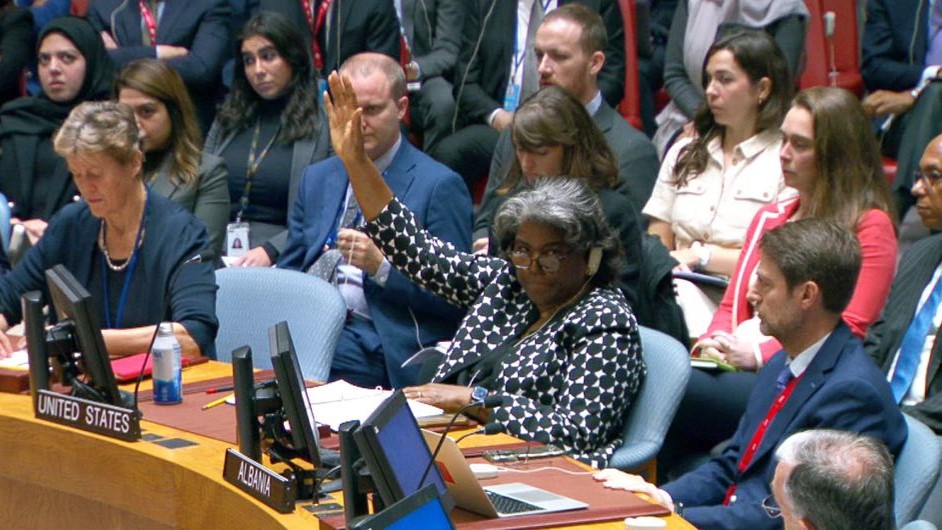On October 18, the United States vetoed a second UN Security Council resolution on the situation in Gaza. Presented by Brazil, the draft text had called for “humanitarian pauses” to allow for “full, safe and unhindered” humanitarian access of UN agencies in the besieged enclave.
The text had also called for the revocation of Israel’s orders for Gazans to leave all areas of Wadi Gaza and move to the south of the Strip.
It is important to re-emphasize that not only was this so-called “evacuation” order widely condemned as a blatant act of ethnic cleansing, Israel proceeded to bomb convoys of Gazans who were fleeing to the southern part, killing at least 70 people and injuring hundreds more.
Wednesday’s resolution was presented less than two days after the US, the UK and France rejected a similar resolution presented by Russia, which had instead called for an immediate ceasefire.
In the time since, Israel has continued its genocidal bombardment of Gaza, killing 121 people since Wednesday evening alone. Israeli occupation forces also killed at least seven Palestinians in the West Bank overnight and on Thursday morning, bringing the death toll in the occupied territory to 69, since October 7.
According to an update shared by Gaza’s Health Ministry on October 19, Israel has killed 3,478 Palestinians and injured another 12,065 so far. The ministry has also received reports of approximately 1,300 people who are missing under the rubble of destroyed buildings and infrastructure.
Ahead of the vote on October 18, Russia had proposed two amendments to the Brazil-drafted resolution. One would have called for an “immediate, durable and fully respected humanitarian ceasefire,” along similar lines to the previously defeated draft resolution that was tabled by Russia.
A second amendment would have included the insertion of a paragraph to unequivocally condemn the indiscriminate attacks on civilians and civilian objects in Gaza, including the Israeli attack on the Al-Ahli Baptist Hospital on October 17 which killed approximately 500 people.
Ultimately, both amendments proposed by Russia on Wednesday were vetoed by the US.
Addressing the Security Council later in the session, UN humanitarian aid chief Martin Griffiths also noted that the hospital had been among 20 hospitals in northern Gaza that had been “subject to the announcement by the Israeli authorities that civilians should leave for their safety.” In other words, they were asked to evacuate or risked being bombed.
“When that hospital was hit, it was fully operational. And indeed, it had reached its maximum capacity. It was, therefore, overflowing with patients, including women and children”, Griffiths said, adding that it was also sheltering people who had been displaced.
He further acknowledged that prior to Tuesday’s deadly attack, the hospital had already been struck on October 14. A senior health official in Gaza had also told Al Jazeera that Israel had fired artillery shells at the facility on the day in question, and proceeded to call the hospital’s director saying “we had warned you yesterday with two shells”.
Standing amid the bodies of those massacred on October 17, British-Palestinian surgeon, Dr. Ghassan Abu Sita, who had been working at the Al Ahli hospital described the attack and said that the attack “is a war crime that the world has seen coming.”
“Israel has been warning the entire world that it was going to attack Palestinian hospitals and it did exactly that,” he said, adding that “every western politician who has declared unconditional support for Israel’s war efforts on the Palestinian people has the blood of these children on their hands.”
Thursday’s draft resolution prepared by Brazil was prompted by the need for the Council to take a “unified position”, Brazil’s permanent representative to the UN and current Security Council president Sérgio França Danese said.
The text repeated the call for the provision of essential supplies including food, electricity, water and medical supplies to Gaza. While condemning all acts of violence against civilians, it specifically condemned the “heinous terrorist attacks by Hamas”, and called for the immediate release of all hostages.
This too proved to be insufficient for the US as it vetoed the resolution, with US Ambassador Linda Thomas-Greenfield stating that the document did not mention “Israel’s right of self-defense”.
This was reiterated by its NATO ally, the UK, which abstained from the vote on the basis that the “text could have been clearer” on Israel’s “inherent right to self-defense” and that it “ignored the fact that innocent Palestinian civilians were being used as human shields”.
UK Prime Minister Rishi Sunak has arrived in Israel and is set to hold talks with Israeli PM Benjamin Netanyahu on October 19.
Responding to the vote, Majed Bamya, the Deputy Permanent Observer of the State of Palestine to the UN, said on X (formerly, Twitter), that “the draft resolution was biased, politicized, failed to acknowledge Palestinian victims and the Israeli indiscriminate attacks against them, failed to call for a ceasefire, all to avoid a US veto”.
Meanwhile, during a session of the UN Human Rights Committee on Thursday, several participants turned their backs in protest as US Ambassador Michelle Taylor addressed the body.





